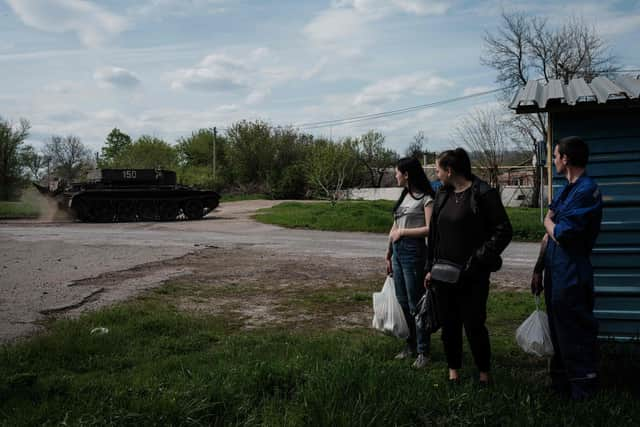Ukraine conflict: Russia’s military is now significantly weaker as a result of its invasion of Ukraine - MoD
In an intelligence update, the MoD highlighted that Russia had drastically increased military spending but that despite a numerical advantage, strategic failures and execution had resulted in a failure to dominate.
The update read: “Russia’s defence budget approximately doubled between 2005 and 2018, with investment in several high-end air, land and sea capabilities. From 2008 this underpinned the expansive military modernisation programme New Look.
Advertisement
Hide AdAdvertisement
Hide Ad"However, the modernisation of its physical equipment has not enabled Russia to dominate Ukraine. Failures both in strategic planning and operational execution have left it unable to translate numerical strength into decisive advantage.
"Russia’s military is now significantly weaker, both materially and conceptually, as a result of its invasion of Ukraine. Recovery from this will be exacerbated by sanctions. This will have a lasting impact on Russia’s ability to deploy conventional military force.”
A senior US official also warned that Russian is planning to annex large parts of eastern Ukraine this month and recognise the southern city of Kherson as an independent republic.
Michael Carpenter, US ambassador to the Organisation for Security and Co-operation in Europe (OSCE), said the suspected actions would be “straight out of the Kremlin’s playbook” and not recognised by the US or its allies.
The latest update from the MoD comes following a warning from the Ukrainian ambassador to the UK who said that the country are past the point of negotiations with Russia as they approach the “63rd day of a three-day invasion”, according to the country’s ambassador to the UK.


Vadym Prystaiko told ITV’s Good Morning Britain: “When we had the chance to negotiate with them and come to some form of neutral points, neutrality itself as a political surrogate factor was considered.
“Now, these negotiations have stalled, for obvious reasons after the atrocities in Bucha. Many Ukrainians can’t even imagine how we could sit at the table of negotiations with these people now.
“The reasonable politicians will remind us that actually we have to sit at the table, because all the worst wars ended up in forms of negotiations. But, frankly speaking, many Ukrainians believe that we have to defeat them physically now.
Advertisement
Hide AdAdvertisement
Hide Ad“Maybe that’s better for Russians. Maybe they will be able to see that this regime is bringing them down along with the whole of Russia.”
Ukraine have claimed that Russia has once again resumed activity in the Mariupol steel mill that has become the last stronghold of resistance in the bombed-out city, Ukrainian fighters said.
The bombardment comes after a brief weekend ceasefire allowed the first evacuation of civilians from the plant.
In Mariupol, more than 100 people — including elderly women and mothers with small children — left the rubble-strewn Azovstal steelworks on Sunday and set off in buses and ambulances for the Ukrainian-controlled city of Zaporizhzhia, about 140 miles to the north west, according to authorities and video released by the two sides.
Mariupol’s deputy mayor Sergei Orlov told the BBC the evacuees were making slow progress and would probably not arrive in Zaporizhzhia on Monday as hoped.